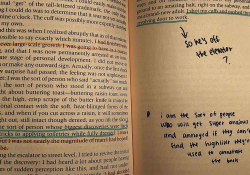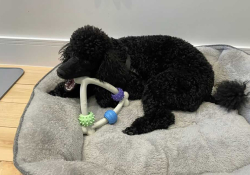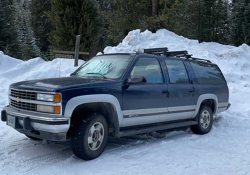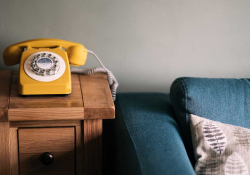Storying the Body
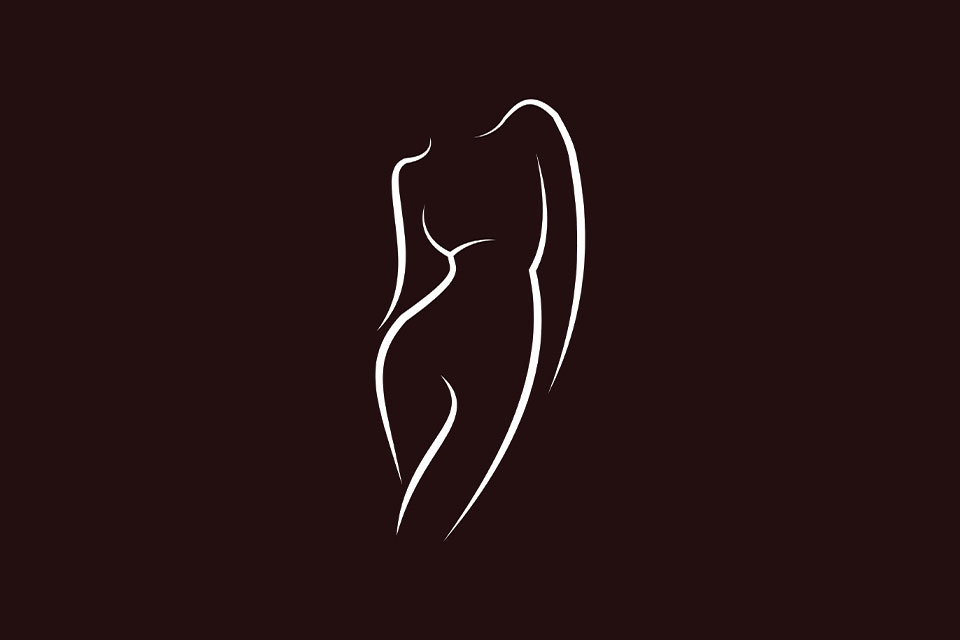
I’m sitting on an exam table talking to a nurse practitioner about a pain in my lower left abdomen. I’ve only ever been to the gynecologist once—she prescribed me birth control to treat severe menstrual cramps and told me I shouldn’t be having sex. I wasn’t.
I was sixteen then, and I’m nineteen now. This is a different doctor—my last one was in my hometown, and my mom had driven me. Now I’m in college, hours away from home, and I’m by myself, and my mom doesn’t know that there’s anything wrong with me.
The practitioner does a pelvic exam, and it doesn’t feel good. It’s uncomfortable, but I’m not as anxious as I thought I would be to have a stranger touching me like that. She presses on my abdomen, and I flinch in pain. Her hand is inside me and it hurts. Then she’s removing her latex gloves and telling me she thinks I might have ovarian cysts. That’s what my dad suggested. I had cried when he said that—it’s not that big of a deal, I don’t think, but it’s something that’s wrong with me. She orders an ultrasound.
*
I’m sitting on an exam table, once again naked from the waist down. The ultrasound place is in one of those neighborhoods that gets repurposed for dentistry and physical therapy and other medical stuff. I’m sitting in what would be the living room. There’s hardwood floors and mahogany cabinets built into the walls, and a large white exam table in the center of the room. I’m lying down on it with my legs spread apart, embarrassed because I’m on my period, and there’s another stranger about to touch my vagina. I didn’t know this would happen—first, she put the gel on my belly and rubbed the wand around, like in the movies when they check for a baby’s heartbeat. But I’m not pregnant, and this ultrasound isn’t working. She pulls out a bigger wand—it’s at least a foot long, and it’s metal, and it’s scary. It looks like a curling iron wrapped in plastic. She inserts it, and I spend ten minutes in excruciating pain. I didn’t know this was going to happen. She pushes it in, all the way, all twelve inches in my broken, nineteen-year-old body. She turns it at every angle, ninety degrees, every direction. I’m staring at the ceiling, trying not to call out in pain. She doesn’t say anything. Tears are streaming into my ears. I don’t know how long it lasts—I think ten minutes. Ten minutes feel like hours. Like days.
She finishes and tells me they’ll call me with the results in a few days. She leaves me to get dressed. I shakily stand up and look at the table. There’s blood everywhere.
*
I’m sitting in my car, driving home from school to see my dad. I took my medicine this morning—when I saw the doctor about the ultrasound, she had told me I didn’t have cysts. She said I have chronic pelvic pain and prescribed me some medication that I had to take three times a day. She told me all this before she examined me. She printed off my diagnosis on a piece of paper before she ever walked in the room. We had never met before.
The doctor printed off my diagnosis on a piece of paper before she ever walked in the room. We had never met before.
I feel my stomach churn. I pull over and throw up into an old McDonald’s bag.
*
I’m sitting on the bathroom floor at work, throwing up into the toilet. I only ate a banana before taking my medication. I’m going to clock in late.
I throw my medication away when I get home.
*
I’m sitting on an exam table, seeing a new nurse practitioner, and a new doctor altogether. I’ve seen them a few times now. They’re telling me that since they’ve tried a few medications and antibiotics on me, they want to send me to physical therapy. They say that after six months we’ll know if it worked. They don’t think it’s endometriosis.
I think it’s endometriosis. I insist that I have surgery first. It takes surgery to diagnose—I want the surgery. I want to know once and for all.
*
I’m lying in a hospital bed. I hear a feminine voice to my right. I shift my head to the right, then back to the left, then back to the right. My eyelids feel heavy. It’s hard to open them.
“Hi there,” the voice says. I feel cool fingers on my hand where my IV is. I hum in response.
“We’re just waiting on your room to be ready,” she tells me. I hum again. “We have you on morphine for the pain.” I feel something small placed into my hand. “There’s a button here”—someone’s hands gently guide my thumb to a button on the end—“when you press it, it’ll give you more morphine. You can only get more every eight minutes. If you press it more than once before the eight minutes are up, it’ll make this noise.” She helps me press the button, and I hear a gentle beep telling me no.
“Okay,” I hum sleepily. She pats my hand and tells me to go back to sleep. I oblige—this is a fantastic nap.
*
I’m still in a hospital bed. I’m still so sleepy. I wake up, and the ceiling is moving. They’re wheeling me in my bed, somewhere new. Everything is blurry and I can’t see. They push me through a door, and I see the blurry figure of my dad standing next to the blurry figure of my boyfriend.
“Hey, kiddo,” my dad speaks gently as they center my bed in the room.
“Hi, daddy,” I respond sluggishly. “Hi, baby. I love you.” They each respond, “I love you too.”
“Okay, kid . . .” I can’t see my dad, but I can hear his voice from somewhere in the room. I can’t really see anything. “You’re gonna spend the night here tonight, okay?”
“Oh,” I say. The surgery—an exploratory laparoscopy—was supposed to be an outpatient procedure. I was supposed to go home and rest for a day or two then go back to work on Monday. “That means something is wrong.” As I say it, I begin to cry. I can almost feel my dad’s heart break from across the room. Someone is brushing my hair back. I try to wipe away my tears, but the IV is in my hand, and it hurts to move it. I press my morphine button, once to get it to release, twice to get it to beep. I need to make sure it’s going to work. Something hurts—I’m not sure what, exactly, but I know it hurts. People are talking, and I’m not entirely sure what’s going on.
“I can’t see,” I say. “Can I have my glasses?” The hand brushing my hair disappears.
“The doctor will be here soon, and she’ll explain everything.” Someone gives me my glasses. I put them on, and things begin to make more sense. My boyfriend is standing next to me, and he begins to brush my hair back again. My dad is leaning against the wall across from my bed. He looks sad. There are nurses fixing my IV bag and adjusting my bed.
“I’m sorry, I just think you should hear it from her,” my dad says. He eventually tells me anyway. That they opened me up because they found a tumor, and that they couldn’t take it out, so they just left it there for a better doctor to take out in a few months. There’s a huge scar across my abdomen—a cesarean. Like the kind when you have a baby and need a C-section, except I can’t have a baby, I just have a tumor. The incision is caked in dried blood, and it’s at least six inches long.
There’s a huge scar across my abdomen—a cesarean. Like the kind when you have a baby and need a C-section, except I can’t have a baby, I just have a tumor.
The doctor does eventually come in and fill in the details that my dad couldn’t. The “you have cancer” details, the “this is what’s next” conversation. I find myself losing the will to nod along.
*
I’m sitting in a hospital bed, trying to stand up. My incision makes it nearly impossible for me to stand by myself. I haven’t stood up yet, but my nurses say it’s time. My boyfriend is sitting on the pullout in front of me, watching as I grip tightly onto my nurse’s arms. I can’t stand. They have to lift me, then gently rest my weight back onto my feet. There’s something warm dripping down my leg. As we walk—one step every few seconds—blood drips on the floor behind me, leaving a trail to the bathroom.
*
I’m lying in a hospital bed, and it’s the middle of the night. I need to pee, and I can’t stand up. My boyfriend is sleeping uncomfortably on the pullout, a mere three feet away from me. I know I’m supposed to ask him for help if I need to get up. But it’s just the bathroom. I just need to pee. I should be able to pee by myself.
I try to sit up, then whimper in pain. It just doesn’t work. The muscles don’t work, they won’t let me. I have to use my arms and nothing else. If I use my legs, I’ll accidentally engage my abdominal muscles, and then I’ll hurt again, and fall, and have to start over. I have to do all of this with my arms.
I use the remote for the bed to sit up as much as possible since I can’t sit up on my own. Then I take careful hold of the bed rails and try to pull myself onto my side so that I can push up into a sitting position, using only my arms. I did it once today. I can do it again. I can try to.
I can’t.
I collapse backward into the bed and try to catch my breath. I’m in an awkward, uncomfortable position, and I can’t move. I need to pee. I open my mouth to finally call for my boyfriend to help, but I can’t. Nothing comes out. My voice is empty. Maybe it’s gone.
I reach forward and hit my ring on the metal of the bed tray, over and over and over again. I don’t know how long it will take—he’s a heavy sleeper. I guess, though, that the pullout must be uncomfortable, because he wakes rather quickly. When he sees the way I’m positioned, he rushes to my side, gently helping me sit up.
“Baby, what are you doing?” He’s chiding me in the gentlest voice he can muster.
“I need to pee,” I say quietly. He helps me sit up, then wraps my arms around his neck. After only a day, he already has a routine to help me rise. He lifts me up, then gently rests my weight back onto my own feet. I’m mostly bent over—the incision won’t let me stand up straight. We take slow, careful steps to the bathroom together. A strong young man and his broken lover.
He sets me down slowly onto the toilet, then leaves the bathroom and shuts the door behind him. I can’t even sit down without him, but he still attempts to leave me with some kind of dignity and privacy.
I look down at my scar. It’s terrible. It’s covered in dried blood, red and black, stretching between my hips. I can feel it. I can feel my organs pushing against it. I can feel that it’s just skin sewn together. I reach down and pick at some of the dried blood, hoping that it will make it look less horrifying. Underneath is bare, fresh flesh, shiny and new, sewn together and threatening to separate. I can see where it would. I can see where, if I flex wrong or stretch too far, my skin would rip apart and all my organs would fall out onto the floor. I can feel my tumor-ridden ovaries pressing against the incision, threatening to spill out in front of me. I’m sobbing. My boyfriend rushes back into the bathroom and wraps his arms around me.
“I can feel it,” I sob to him, “it’s gonna open, everything’s gonna fall out, I’m gonna die.”
I’m gonna die.
He gently shushes me and promises me it won’t happen, that the stitches will hold together. We sit there for a while, him holding me as I cry on the toilet.
Tulsa




